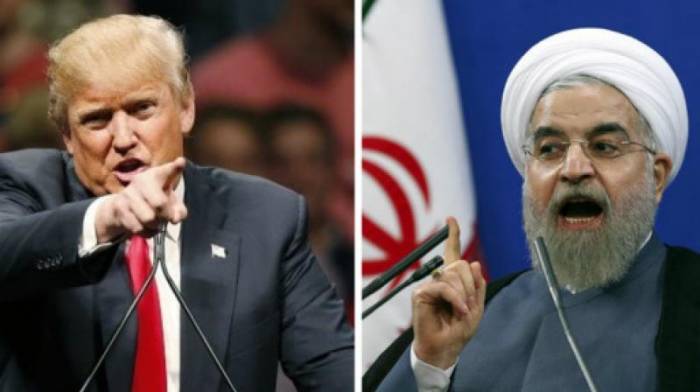The U.S. and Iran have had a rocky relationship for a while now, but now that Iran has “violated” a key element in the 2015 international agreement that mandated the country to limit its development of nuclear weapons, an empty shot in a game of Russian roulette between the states has begun.
The Iranian state news service, Fars, reported Monday that the country’s enriched uranium stockpile exceeded 300 kilograms, which violates the 2015 Joint Comprehensive Plan of Action (JCPOA), a first for Iran, adding more tension between the players.
This report came out in retaliation after the Trump administration’s “maximum pressure” campaign and European powers’ inability to set Iran free of the U.S. sanctions on selling its oil.
The news also follows President Trump’s persistent slide away from the terms of the deal signed by his predecessor, former President Obama. The Trump administration wants a Senate-approved agreement with Iran to replace the 2015 nuclear deal, U.S. Special Representative for Iran Brian Hook told Al Jazeera.
To add insult to injury, other signatories of the deal, notably strong U.S. allies like France and the U.K., failed to diffuse tensions.
A senior official with Iran’s nuclear program said that the country could enhance its enrichment to 20 percent. Although this is not the amount needed to develop a nuclear weapon, the U.S., U.K. and Israel issued anxious statements in response.
“Iran needs to be careful,” Trump said.
While the U.K. warned Iran for having “broken the terms of the JCPOA”, the statement from its Foreign and Commonwealth Office said the U.K. “remains fully committed to the deal” and called on Iran to “immediately stop and reverse all activities inconsistent with its obligations.”
A vocal critic of the nuclear deal, Israeli Prime Minister Benjamin Netanyahu made a threat to Iran following the announcement of nuclear enrichment.
Standing in front of an F-35 stealth fighter on an Israeli airbase, Netanyahu said Iran had “recently been threatening the destruction of Israel” and “ought to remember that these planes can reach every place in the Middle East, including Iran and certainly, Syria.”
China and Russia both expressed regret but suggested the U.S. had “pushed Iran into a corner.”
The foreign ministers of Britain, France and Germany, along with the foreign affairs chief of the European Union, said in a statement that Iran was “pursuing activities inconsistent with its commitments” under the deal. “These compliance issues must be addressed within the framework of the JCPOA, and a Joint Commission should be convened urgently.”
“Twenty percent is not needed now, but if we want we will produce it,” said Behrouz Kamalvandi, a spokesman for the Atomic Energy Organization of Iran, according to Fars. “Now that we have gone past the 3.67 percent enrichment, there won’t be any problem with this action.”

From left to right, Behrouz Kamalvandi, spokesman for Iran’s Atomic Energy Association; Iranian government spokesman Ali Rabiei and Iranian Deputy Foreign Minister Abbas Araghchi attend a press briefing, July 7 in Tehran, Iran.(EBRAHIM NOROOZI/AP)
The warning comes at a time of particular tensions between Iran and the U.K., after British marines seized a cargo ship transiting the Strait of Gibraltar. Tehran has dismissed the seizure as “maritime piracy” and accused the U.K. of acting on behalf of the U.S.
The U.K. navy said a commercial ship, the Heritage, was passing through the critical waterway when three Iranian paramilitary vessels tried to “obstruct” its path. A navy frigate forced itself into a position between the British tanker and the Iranian boats, issuing verbal warnings. The Iranians turned away.
“We are concerned by this action and continue to urge the Iranian authorities to deescalate the situation in the region,” the British government said in a statement.
Iran’s elite Islamic Revolutionary Guards Corps denied the allegations, its state news service reports, saying it would have immediately seized a ship like the British Heritage if it had received such orders. Iranian Foreign Minister Javad Zarif dismissed the British claims as “worthless”, adding “they are seeking to cover up their weaknesses with such claims.”
The escalation of tensions between Iran and the U.S. continued when the U.S. enforced punishing sanctions and new warnings against Tehran. These tensions extend to the country’s traditional “foe” — Israel.
“Iran can never have nuclear weapons,” National Security Adviser John Bolton said following Iran’s nuclear enrichment threat. “Not against the USA, and not against the world.”
When asked about Iran’s threat, Trump refused to reveal specifics on how the U.S. planned to respond.
“I can only say, ‘you’ll see,'” Trump said at a press conference during the 2019 G-20 summit in Osaka, Japan. “We cannot let Iran have a nuclear weapon. Just can’t do it.”
Despite Iran’s call for negotiation and adherence to the 2015 U.S.-Iran nuclear deal, the Trump administration continues to add pressure on Iran through sanctions.
“Iran advises Europe and the U.S. to get back to logic, the negotiating table, understanding, respect for law and respect for the U.N. Security Council resolutions, which means that everyone should act based on the nuclear deal,” Iranian President Hassan Rouhani told a meeting of his cabinet in Tehran.
The situation with Iran follows a series of military events in recent weeks. The Pentagon has deployed new military assets to the region, including an aircraft carrier strike group and 1,000 new troops, amid intelligence it says “shows” Iran plans to carry out new attacks against the U.S. and its allies.
With so much at stake and Iran confronting many rivals in a tensed up region where it faces the U.S. allied Gulf states, along with Israel and the American bases surrounding Iran, the potential for sharp escalation endures, especially if the U.S. or Israel decide to take military action against Iran that could set off a wider war.






Leave a Reply